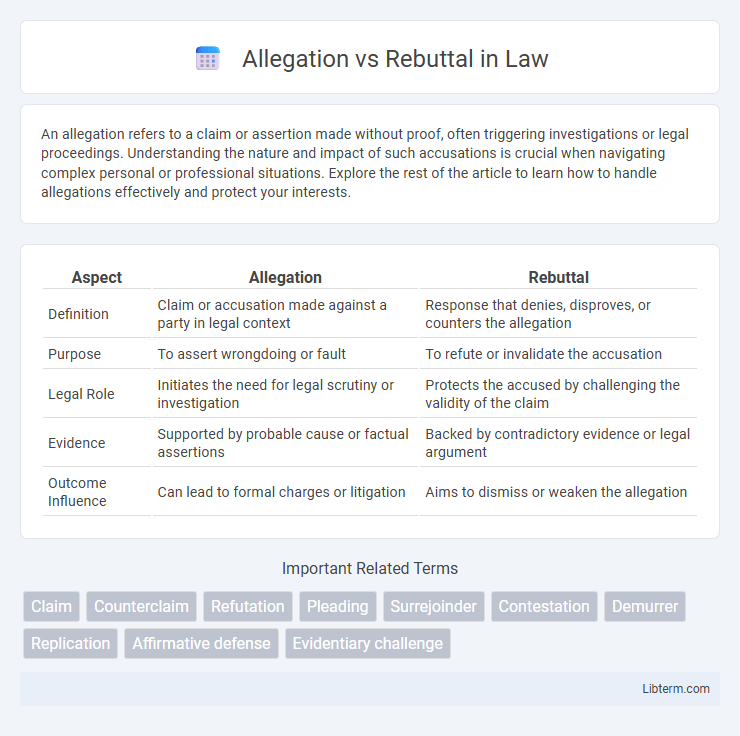An allegation refers to a claim or assertion made without proof, often triggering investigations or legal proceedings. Understanding the nature and impact of such accusations is crucial when navigating complex personal or professional situations. Explore the rest of the article to learn how to handle allegations effectively and protect your interests.
Table of Comparison
| Aspect | Allegation | Rebuttal |
|---|---|---|
| Definition | Claim or accusation made against a party in legal context | Response that denies, disproves, or counters the allegation |
| Purpose | To assert wrongdoing or fault | To refute or invalidate the accusation |
| Legal Role | Initiates the need for legal scrutiny or investigation | Protects the accused by challenging the validity of the claim |
| Evidence | Supported by probable cause or factual assertions | Backed by contradictory evidence or legal argument |
| Outcome Influence | Can lead to formal charges or litigation | Aims to dismiss or weaken the allegation |
Understanding Allegations: Definition and Context
Understanding allegations involves recognizing them as formal claims or accusations made against an individual or entity, often implying wrongdoing or misconduct. These statements are typically based on perceived evidence or suspicion and serve as a starting point for investigation or legal proceedings. Clarifying the context of allegations helps in distinguishing between unfounded claims and those requiring serious consideration through appropriate rebuttal or defense.
What Constitutes a Rebuttal?
A rebuttal constitutes a direct response to an allegation that challenges the accuracy, validity, or relevance of the claim presented. It involves presenting contradictory evidence, logical arguments, or alternative interpretations to weaken or dismiss the original accusation. Effective rebuttals rely on factual data, credible sources, and clear reasoning to refute the points made in the allegation.
Key Differences Between Allegation and Rebuttal
Allegation refers to a claim or assertion made without proof, often presented as part of an accusation in legal or formal contexts. Rebuttal constitutes a response that challenges or refutes the allegation by presenting contrary evidence or arguments to disprove the claim. The key difference lies in their roles: allegation introduces an unproven claim, while rebuttal provides a defense aimed at invalidating that claim.
Common Types of Allegations in Disputes
Common types of allegations in disputes often include breach of contract, negligence, fraud, and misrepresentation. Claimants typically assert these allegations to establish liability or fault, supported by evidence such as documents, witness testimony, or expert analysis. Rebuttal strategies focus on disproving these claims through counter-evidence, demonstrating compliance with contractual terms, or proving the absence of intent or negligence.
Effective Strategies for Crafting a Rebuttal
Effective strategies for crafting a rebuttal involve thoroughly understanding the original allegation and gathering clear, evidence-based counterarguments that directly address each point. Employing precise language and maintaining a respectful tone enhances credibility while dismantling misconceptions. Incorporating relevant facts, logical reasoning, and credible sources strengthens the rebuttal's impact and persuasiveness.
Impact of Allegations on Reputation and Trust
Allegations can severely damage an individual's or organization's reputation, leading to loss of trust among stakeholders and the public. The intensity and credibility of allegations often dictate the extent of reputational harm, affecting customer loyalty, investor confidence, and employee morale. Effective rebuttals, supported by transparent evidence and clear communication, are crucial in mitigating damage and restoring trust.
Legal Considerations: Allegation vs. Rebuttal
Legal considerations in allegation vs. rebuttal revolve around the burden of proof and the evidentiary standards required to support each party's claims. An allegation constitutes a formal assertion of wrongdoing or fact that initiates legal scrutiny, while a rebuttal serves to counter or disprove these claims using admissible evidence and sound legal arguments. Courts carefully evaluate the credibility and sufficiency of both allegations and rebuttals to ensure just resolution based on substantive proof rather than mere assertions.
Role of Evidence in Supporting Allegations and Rebuttals
Evidence plays a critical role in substantiating allegations by providing objective data and credible information that validate claims of wrongdoing or misconduct. In rebuttals, evidence is essential to challenge the validity of allegations by presenting contradicting facts, alternative explanations, or proof of compliance with relevant standards. The strength and reliability of evidence determine the persuasiveness of both allegations and rebuttals, influencing outcomes in legal, investigative, and organizational contexts.
Handling Allegations and Rebuttals in Media
Effective handling of allegations in media requires prompt fact-checking and transparent communication to maintain credibility and public trust. Rebuttals should be clear, evidence-based, and concise to counter misinformation and protect reputations. Implementing strategic media training helps spokespeople address accusations confidently while emphasizing accountability and truth.
Best Practices for Addressing Allegations and Rebuttals
Effectively addressing allegations and rebuttals requires thorough evidence collection and clear, concise communication to substantiate claims or counterclaims. Maintaining transparency and neutrality fosters trust, while timely responses prevent escalation and demonstrate accountability. Implementing structured documentation and engaging legal or professional counsel enhances credibility and ensures compliance with relevant standards.
Allegation Infographic

 libterm.com
libterm.com